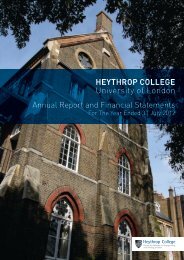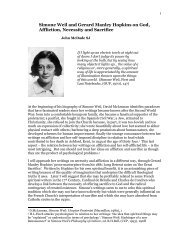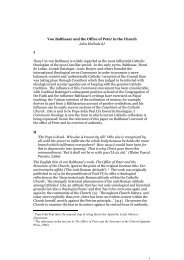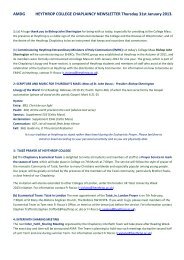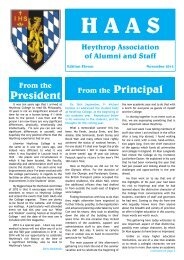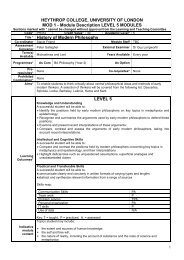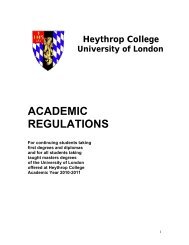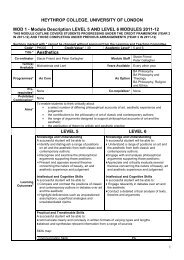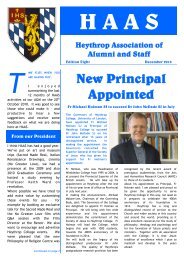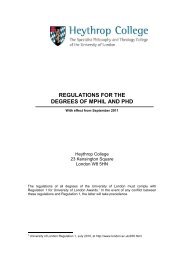Wallace_Stevens.pdf - Heythrop College
Wallace_Stevens.pdf - Heythrop College
Wallace_Stevens.pdf - Heythrop College
You also want an ePaper? Increase the reach of your titles
YUMPU automatically turns print PDFs into web optimized ePapers that Google loves.
10<br />
confessing it. We can do no more than put ourselves on the guard as to our own<br />
proceeding, and protest against it, while we do it. We can only set<br />
right one error of expression by another. By their method of antagonism we steady our<br />
minds, not so as to reach their object, but to point them in the right direction: as in an<br />
algebraical process we might add and subtract in series, approximating little by little, by<br />
saying and unsaying, to a positive result. 30<br />
Theology for Newman, one feels, was a ‘zero-sum game’: the more you take away what might be<br />
positive, the less grasp you have on God. Theology is not an accumulation of things we know<br />
about God; properly conducted, it issues in a growing number of things that we know do not apply<br />
to God. Newman knows that theology is chastening and difficult, a struggle with crude, resistant<br />
words, ‘a raid on the inarticulate/ With shabby equipment always deteriorating’, as Eliot puts it. 31<br />
But of course, that is theology, a reflective discourse on religion which is always in danger of<br />
escaping from the intellectual controls of the theological thought police engaged in quality<br />
control. It would follow then that the goal of fiction and imagination, in the absence of God – a<br />
fictive idea anyway – is not to persuade us, but to pleasure us intellectually. Clearly the status of<br />
the ‘supreme fiction’ that would replace God bothered <strong>Stevens</strong>, and with good reason. He<br />
describes himself as obsessed with this idea of the ‘supreme fiction’ He writes:<br />
When I get up at 6 o’clock in the morning… the thing crawls all over me; it is in my hair<br />
when I shave and I think of it in the bathtub. Then I come down here to the office and,<br />
except for an occasional letter like this, have to put it to one side. After all, I like Rhine<br />
wine, blue grapes, good cheese, endive and lots of books, etc., etc., etc., as much as I like<br />
the supreme fiction. 32<br />
<strong>Stevens</strong>’ closing remark is meant to be light-hearted of course, but there is a serious point here, as<br />
I suspect <strong>Stevens</strong> knew: does the supreme fiction that issues in intellectual, aesthetic pleasure, do<br />
anything more for us than these other things – wine, grapes, cheese, etc. – except that it does it in<br />
a way that pleases and satisfies the mind and not the taste buds A form of intellectual hedonism<br />
sated by what is on offer, perhaps much as an Oxford don might have savoured a clever remark<br />
from Isaiah Berlin in the 1960s. Does the supreme fiction do any more for us than Isaiah Berlin<br />
or even Irving Berlin<br />
His insistence that the Supreme Fiction ‘Must Be Abstract’ [the title of the first section of ‘Notes<br />
Toward a Supreme Fiction’] is meant to eliminate earlier, inherited fictions such as the idea of an<br />
‘inventing mind’ such as God, and cleanse the mind of its old furniture. With reference to this<br />
long poem, Joan Richardson speaks of the influence on <strong>Stevens</strong> of Freud’s case for the ‘necessity<br />
of clearing away illusions of all kinds’ among them ‘the outworn remnants of religious<br />
attachments’. 33 Nietzsche too is also present in the purifying of perception that precedes an<br />
engagement with the real:<br />
Begin, ephebe, by perceiving the idea<br />
Of this invention, this invented world,<br />
The inconceivable idea of the sun.<br />
You must become an ignorant man again<br />
And see the sun again with an ignorant eye<br />
And see it clearly in the idea of it.<br />
Never suppose an inventing mind as source<br />
30 J.H.Newman, The Theological Papers of John Henry Newman on Faith and Certainty, ed.<br />
J.D.Holmes (Oxford University Press, 1976), 102<br />
31 ‘T.S. Eliot, ‘East Coker’ in Four Quartets.<br />
32 L, 431<br />
33 J.Richardson, <strong>Wallace</strong> <strong>Stevens</strong>: the Later Years 1923-1955 (Beech Tree Books, 1988), 58.



